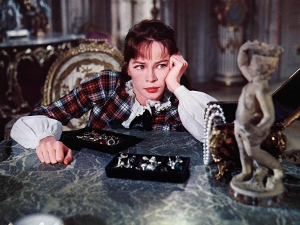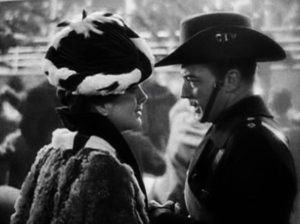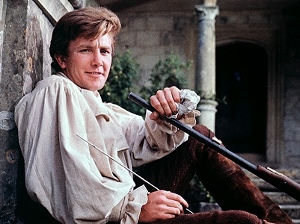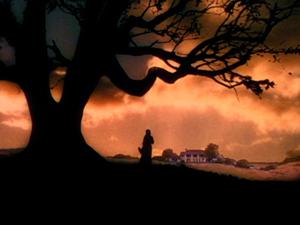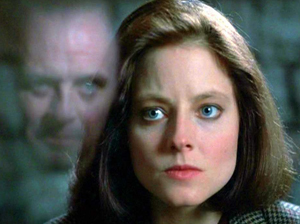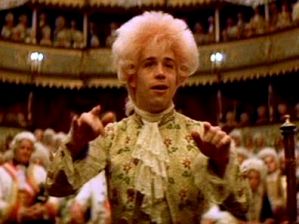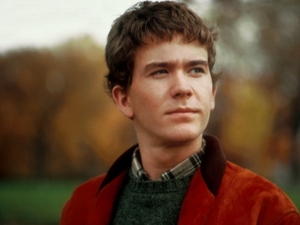Cavalcade (1933)
Tom Jones (1963)
Gone with the Wind (1939)
[7]
Hollywood’s most celebrated melodrama is still entertaining today. Vivien Leigh does a remarkable job playing one of the most volatile heroines in film history. Scarlet O’Hara begins Margaret Mitchell’s story damned spoiled, and I’m not sure she ever really learns her lesson, but Leigh renders a subtle transformation while always remaining true to character. My other favorites are Olivia de Havilland (sweet in everything she’s in), Hattie McDaniel (who deserved her Oscar), and Butterfly McQueen (for bringing a little comedy to the proceedings). I don’t get Leslie Howard as Ashley. For being the crux of the movie’s romantic triangle, I’d like to have known what was so darned special about him. Max Steiner’s music, especially the Tara theme, is among the most memorable ever composed for film.
American Beauty (1999)
[5]
SPOILER REVIEW
I really liked American Beauty when it was first released. Maybe I was wooed by its quirky introspection and aesthetic achievments. Or maybe it was screenwriter Alan Ball’s fresh new way of blending the real with the surreal. Or even the meditative lilt of Thomas Newman’s trend-setting score. But whatever the reason(s), watching the film ten years later, I realize — American Beauty ain’t all that. It’s kinda whack.
The Lord of the Rings (2001, 2002, 2003)
The Silence of the Lambs (1991)
[9]
Here we have a horror film so classy, it won the Oscar for Best Picture. Anthony Hopkins and Jodie Foster each deliver career-defining performances as Hannibal Lecter and Clarice Starling, the central characters in author Thomas Harris’ perverse contemporary retelling of Beauty and the Beast. The screenplay balances their provocative banter with a well-constructed mystery surrounding the identity and whereabouts of a serial killer named Buffalo Bill. Ted Levine gives a excellent, unnerving performances as Bill, a man who kidnaps hefty gals and keeps them in a pit. It’s from that vantage point you hear the film’s infamous (and now campy line): “It rubs the lotion on its skin or it gets the hose again.”
Dances With Wolves (1990)
[10]
Kevin Costner’s ambitious ode to the American frontier is grand, romantic storytelling at its best. And talk about an underdog. People were calling it ‘Kevin’s Gate’ months prior to release — and why shouldn’t they? A three-hour long western with most of its dialogue in Lakota Sioux? How could such a movie find an audience, much less sweep the Academy Awards?
Amadeus (1984)
[10]
Straight biographies rarely make great film, but by filtering the subject through another man’s envy, director Milos Forman (One Flew Over the Cuckoo’s Nest) delivers one of the best bio-films I’ve ever seen. This isn’t a film about a composer and his music (how boring would that be?) — it’s a film about an insanely jealous contemporary named Salieri. Salieri, played brilliantly by F. Murray Abraham, turns Mozart’s life and accomplishments into his own personal battle with God. Just watch Abraham pretend to be Mozart’s best friend, all while plotting to destroy him, and you quickly appreciate why the man won an Oscar for his performance.
Ordinary People (1980)
[10]
Robert Redford directs this adaptation of Judith Guest’s novel, about a family reeling from the accidental death of the eldest child. Unlike so many dramas, it’s what you don’t see and what isn’t said that makes Ordinary People such a gut-wrenching, powerfully moving film.
Timothy Hutton, Donald Sutherland, and Mary Tyler Moore give superb performances as family members struggling to reconnect with one another after the tragedy. Hutton won the Best Supporting Actor Oscar for his raw, riveting portrayal of young Conrad Jarrett. Moore plays his mother, an emotionally unavailable woman barricading herself from further distress by ignoring her family’s problems, even after Conrad tries to take his own life. Sutherland plays the father, the mediator between mother and son, desperately trying to hold his family together. Judd Hirsch appears as Conrad’s therapist, a savior shrink who forces Conrad to confront his guilt and fear.

